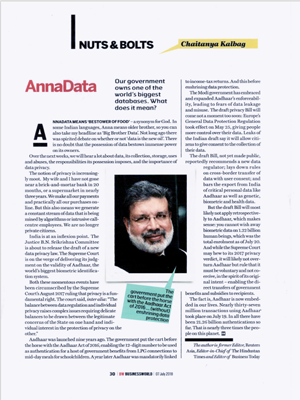ANNA DATA
[Business World]
Published date: 7 Jul 2018
Annadata means “Bestower of food” – a synonym for god. In some Indian languages, Anna means older brother, so you can also take my headline as ‘Big Brother Data’. Not long ago there was spirited debate on whether or not’ data is the new oil’. There is no doubt that the possession of data bestows immense power on its owners.
Over the next weeks, we will hear a lot about data, its collection, storage, uses and abuses, the responsibilities its possession imposes, and the importance of data privacy.
The notion of privacy is increasingly moot. My wife and I have not gone near a brick-and-mortar bank in 20 months, or a supermarket in nearly three years. We make all our payments and practically all our purchases on line. But this also means we generate a constant stream of data that is being mined by algorithms or intrusive call centre employees. We are no longer private citizens.
India is at an inflexion point. The Justice B.N. Srikrishna Committee is about to release the draft of a new data privacy law. The Supreme Court is on the verge of delivering its judgment on the validity of Aadhaar, the world’s biggest biometric identification system.
Both these momentous events have been circumscribed by the Supreme Court’s August 2017 ruling that privacy is a fundamental right. The court said, inter alia: “The balance between data regulation and individual privacy raises complex issues requiring delicate balances to be drawn between the legitimate concerns of the State on one hand and individual interest in the protection of privacy on the other.”
Aadhaar was launched nine years ago. The government put the cart before the horse with the Aadhaar Act of 2016, enabling the12-digit number to be used as authentication for a host of government benefits from LPG connections to mid-day meals for school children. A year later Aadhaar was mandatorily linked to income-tax returns. And this before enshrining data protection.
The Modi government has embraced and expanded Aadhaar’s enforceability, leading to fears of data leakage and misuse. The draft privacy Bill will come not a moment too soon: Europe’s General Data Protection Regulation took effect on May 25, giving people more control over their data. Leaks of the Indian draft say it will allow citizens to give consent to the collection of their data.
The draft Bill, not yet made public, reportedly recommends a new data regulator; lays down rules on cross-border transfer of data with user consent; and bars the export from India of critical personal data like Aadhaar as well as genetic, biometric and health data.
But the draft Bill will most likely not apply retrospectively to Aadhaar, which makes sense: you cannot wish away biometric data on1.22 billion human beings, which was the total enrolment as of July 20. And while the Supreme Court may hew to its 2017 privacy verdict, it will likely not over turn Aadhaar but rule that it must be voluntary and not coercive, in the spirit of its original intent – enabling the direct transfers of government benefits and subsidies to recipients. The fact is, Aadhaar is now embedded in our lives. Nearly thirty-seven million transactions using Aadhaar took place on July 19. In all there have been 21.26 billion authentications so far. That is nearly three times the people on this planet.






